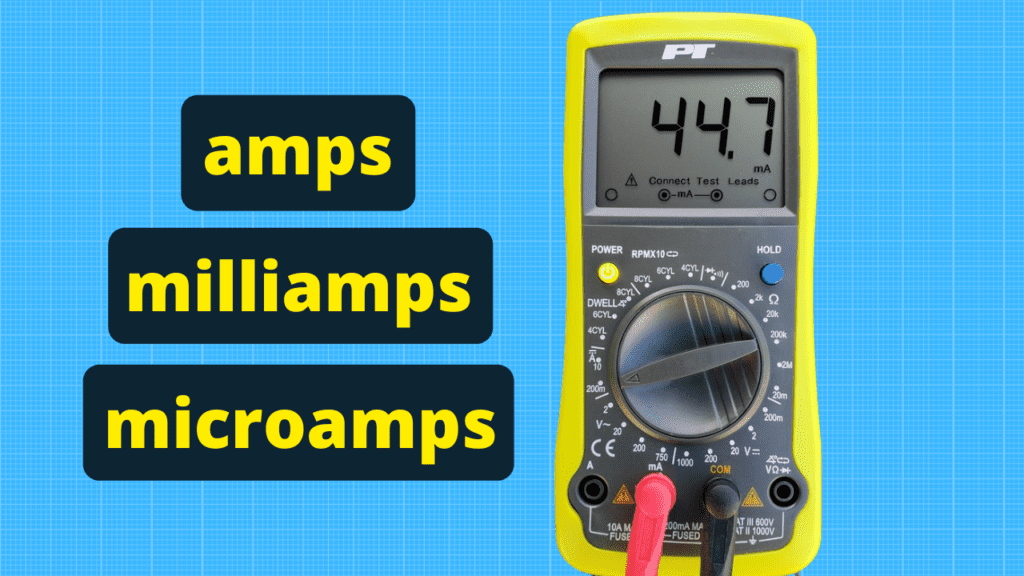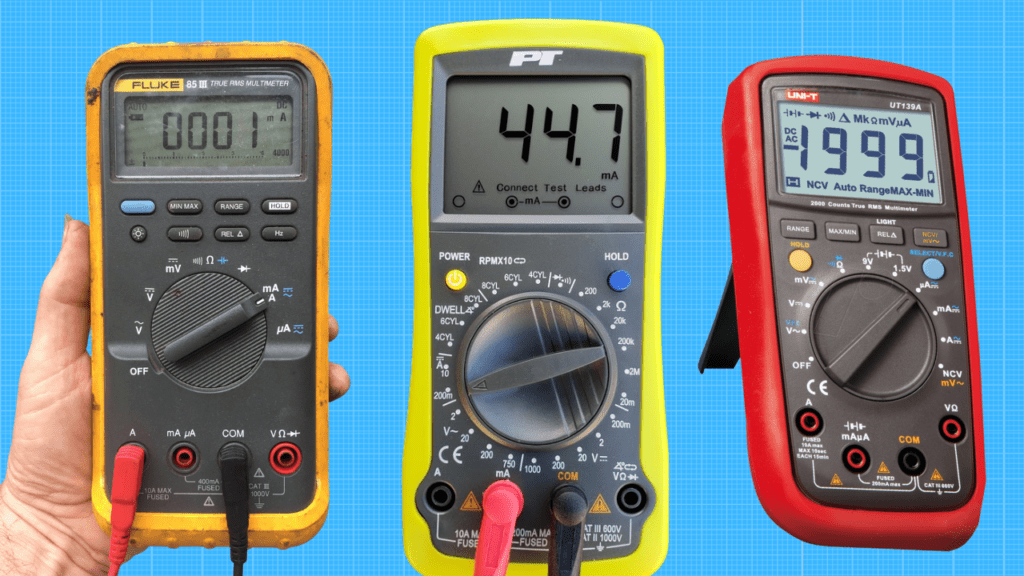What does 50 milliamps look like on a multimeter? Explained
Multimeter shows 50 milliamps as 0.05 amps on the screen. If you ask how? Stay with us because, in this blog post, we will closely look at what 50 milliamps look like on a multimeter!

What is a multimeter and what does it do?
A multimeter is a device that measures a variety of electrical properties, including voltage, current and resistance. It can be used to test batteries, wiring and other electrical components.
Multimeters typically have a wide range of voltage and current measurements, as well as several different resistance measurements. They can also be used to test capacitors and diodes.
A multimeter is an essential tool for electronics. It can help you figure out what’s wrong with a device if it doesn’t work or to use as part of your workbench where you use various electronic components.
In short, a multimeter measures voltage, current and resistance. It can be used to test batteries, fuse, wiring, and various other electrical components. These days they use digital displays which make it easy to read the measurements.
Multimeters use digital displays which make them easy to use and give you accurate measurements, no matter what the current is. Modern multimeters also have been designed to be ergonomic and lightweight so they’re easy to use even if you use them for hours at a time.
What does 50 milliamps look like on a multimeter?
When you’re measuring current with a multimeter, the reading will be in amps. 50 milliamps is equal to 0.05 amps. This means that on most multimeters, the 50 milliamps reading will be displayed as a tiny dot or line on the screen.
When measuring currents with a multimeter, the scale on the meter will be in amps. Milliamps are a fraction of an amp, so when measuring currents that are 10 milliamps or lower, the meter will show a value of 0.01 on the amp scale. This is because the meter measures the current in amps.
When measuring currents with a multimeter, it is important to note that the meter will only measure up to a certain amount of current.
The maximum current that can be measured by most multimeters is around 10 amps. If you are measuring a current that is higher than 10 amps, the meter will show a value of 10 on the amp scale.

Understanding amperes, milliamps and microamps
An ampere (A) is the SI base unit of electric current. It is the amount of current that flows through a conductor when a voltage of 1 volt is applied. A milliamp (mA) is one thousandth of an ampere, and a microamp (μA) is one millionth of an ampere.
Current flow is measured in amperes. A milliamp is a small amount of current, and a microamp is an even smaller amount of current.
Current flow through a circuit can be dangerous if it’s not limited to safe levels. It’s important to understand the difference between amperes, milliamps and microamps when working with electronic circuits.
Table of ampere unit
| Name | Symbol | Conversion | Example |
| microampere (microamps) | μA | 1μA = 10-6A | I = 50μA |
| milliampere (milliamps) | mA | 1mA = 10-3A | I = 3mA |
| ampere (amps) | A | – | I = 10A |
| kiloampere (kiloamps) | kA | 1kA = 103A | I = 2kA |
How to convert amps to microamps (μA)
The current I in microamperes (μA) is equal to the current I in amperes (A) divided by 1000000:
I(μA) = I(A) / 1000000
How to convert amps to milliamps (mA)
The current I in milliamperes (mA) is equal to the current I in amperes (A) divided by 1000:
I(mA) = I(A) / 1000
How to use a multimeter to measure current?
1. Plug in the multimeter and turn it on
2. Touch the black multimeter lead to the COM port (usually the round port on the bottom)
3. Touch the red multimeter lead to the VΩmA port (usually the top port)
4. Select the current measurement range by turning the dial on the multimeter until it matches the symbol for current measurement (this will be a squiggly line)
5. Turn on whatever device you’re testing by flipping its switch or plugging it in
6. Measure the current by placing the black multimeter lead on one of the metal prongs and touching the red multimeter lead to the other metal prong
Multimeters are great tools to help make sure your circuit is working correctly. In this article, we’ll go over how you can use a multimeter to measure the current in a circuit.
You can also watch our tutorial video on how to use a multimeter:
Tips for using a multimeter safely
– Always ensure that the leads of the meter are properly attached to the terminals before taking a reading. This will help prevent inaccurate readings and avoid electrical shock.
– Do not touch the probes of the meter while it is plugged in. This can also result in an electrical shock.
– If you are measuring current in a live circuit, be sure to take caution and ensure that you are wearing safety goggles and gloves. Working with electricity can be dangerous, so always exercise caution when working with electronics.
– Always unplug devices before testing them with a multimeter
– Be careful not to touch the metal probes of the meter with your hands, as this could result in an electrical shock
– Do not overload circuits when testing them with a multimeter
– Keep children and pets away from areas where you are working on electrical projects

Common mistakes people make when using a multimeter
People often make common mistakes when using a multimeter. Some of these mistakes include not reading the range, not checking the fuse, and not turning off the power.
1. Not reading the range: People often don’t read the range on the meter, which can lead to inaccurate measurements. Be sure to read the range before taking any measurements.
2. Not checking the fuse: Another common mistake is not checking the fuse on the meter. If the fuse is blown, you won’t be able to take any accurate measurements.
3. Not turning off power: Another mistake people make is not turning on power before taking measurements. This can be dangerous and can also damage the meter.

Conclusion
The multimeter is an important tool for everyone who works with electricity. If you understand the different measurements and how to use the multimeter safely, you can ensure that your projects stay on track. We believe you now understand what 50 milliamps looks like on a multimeter and how to read that.
